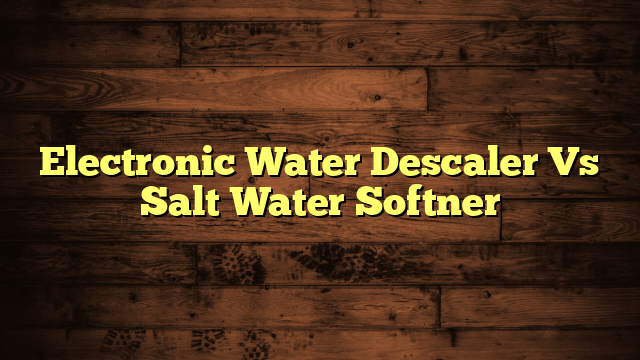Electronic Water Descaler Vs Salt Water Softner
When you're faced with hard water issues, you might wonder whether an electronic water descaler or a salt water softener is the better choice for your home. Both systems aim to enhance your water quality, but they operate in fundamentally different ways, impacting everything from maintenance to environmental concerns. You need to evaluate not just the initial costs, but also how each option fits into your lifestyle and water needs. So, which system will truly provide the best solution for your situation? Let's explore the nuances that could sway your decision.
Key Takeaways
- Electronic water descalers prevent mineral buildup without removing minerals, while salt water softeners replace hardness minerals with sodium through ion exchange.
- Descalers require minimal maintenance, whereas salt systems need regular salt refills and regeneration processes for optimal performance.
- Electronic descalers are eco-friendly with no salt waste, while salt water softeners can contribute to increased sodium levels in water.
- Installation costs for electronic descalers are typically lower, and they consume less energy than salt water softeners, resulting in lower utility bills.
- In extremely hard water conditions, salt water softeners may perform more effectively, whereas electronic descalers might struggle to manage high mineral levels.
Understanding Hard Water
Understanding hard water starts with recognizing its mineral content, primarily calcium and magnesium. These minerals dissolve into your water supply, leading to varying degrees of water hardness.
You mightn't think much about it, but hard water can have a significant impact on your daily life. When you use hard water, you may notice mineral buildup on faucets and showerheads, making them look unsightly and possibly affecting their function.
This buildup doesn't just stop at your fixtures; it can also accumulate in appliances like dishwashers and water heaters, reducing their efficiency and lifespan. You may find that soap doesn't lather as well, and you might need to use more detergent for laundry or dishes.
To combat these issues, it's crucial to identify the hardness level in your water. Testing kits are readily available and can give you insight into the specific mineral content that's affecting your home.
Once you understand the mineral makeup, you can take appropriate steps to manage water hardness effectively, ensuring that you maintain both your appliances and the quality of your daily water usage.
What Is an Electronic Water Descaler?
An electronic water descaler is a device designed to tackle the problems caused by hard water, specifically the mineral buildup from calcium and magnesium. Using advanced electronic technology, it alters the physical properties of these minerals. Instead of removing them like traditional softeners, it prevents them from adhering to surfaces, reducing scaling in pipes, appliances, and fixtures.
Here's a quick comparison to help you understand how it works in the domain of water treatment:
| Feature | Electronic Water Descaler | Traditional Water Softener |
|---|---|---|
| Method of Action | Alters mineral structure | Removes minerals |
| Maintenance Needs | Low | Moderate to high |
| Salt Usage | None | Requires salt |
| Environmental Impact | Minimal | Can contribute to salt runoff |
| Cost of Operation | Lower long-term | Higher due to salt and maintenance |
How Salt Water Softeners Work
Salt water softeners work through a process called ion exchange, where hard water minerals like calcium and magnesium are replaced with sodium ions.
This sodium addition helps prevent scale buildup in your pipes and appliances, but it does come with considerations for your health and the environment.
Regular maintenance and regeneration of the system are essential to keep it functioning effectively, ensuring you enjoy the benefits of softened water.
Ion Exchange Process
The ion exchange process is at the heart of how water softeners effectively combat hard water issues. This chemical process involves exchanging calcium and magnesium ions, which cause hardness, for sodium ions, which don't. When hard water flows through the softener, it passes through a resin bed filled with sodium ions. As the water moves through, the calcium and magnesium ions attach to the resin, displacing the sodium ions. This leaves you with softer water.
Here's a simple table to illustrate how the ion exchange process works:
| Hard Water Component | Action Taken | Resulting Ion |
|---|---|---|
| Calcium | Exchanged for sodium | Sodium |
| Magnesium | Exchanged for sodium | Sodium |
| Softened Water | Contains sodium ions only | Softened Water |
This process continues until the resin bed becomes saturated with calcium and magnesium. At this point, the water softener regenerates, flushing out the hard minerals and replenishing sodium ions. By understanding the ion exchange process, you can appreciate how essential it is in creating soft water for your home.
Sodium Addition Impact
When you think about how salt water softeners work, it's clear that adding sodium plays a crucial role in transforming hard water into a more manageable form. This process involves the ion exchange mechanism, where calcium and magnesium ions are replaced with sodium ions.
Here are three key points to take into account:
- Sodium Sources: Salt water softeners typically use sodium chloride (table salt) as the primary source of sodium. Other sources can include potassium chloride, which is often viewed as a healthier alternative.
- Health Effects: While sodium is necessary for your body's functioning, excessive sodium intake can lead to health concerns, such as high blood pressure. It's important to monitor your water's sodium levels, especially if you're on a sodium-restricted diet.
- Water Quality: The addition of sodium improves the quality of water, preventing scale buildup in plumbing and appliances. This not only enhances the efficiency of your water systems but also prolongs their lifespan.
Maintenance and Regeneration
Maintaining a salt water softener involves regular monitoring and regeneration to guarantee peak performance. You need to check the salt levels frequently, ensuring the brine tank stays filled.
When the resin beads in your system become saturated with hardness minerals, regeneration is necessary. This process typically occurs every few days or based on your water usage. During regeneration, your system flushes the resin beads with a salt solution, restoring their ability to soften water.
To enhance system longevity, it's essential to use the right type of salt, as impurities can impact performance efficiency.
Regularly cleaning the brine tank and checking for leaks or clogs also plays an important role in keeping your softener running smoothly.
Don't forget to inspect the system's control valve and replace any worn parts as needed.
Pros of Electronic Water Descalers
When you consider electronic water descalers, you'll notice several key advantages that make them a compelling choice.
They operate in an eco-friendly manner, using no harsh chemicals and minimizing waste, which benefits both your home and the environment.
Plus, with low maintenance needs and a cost-effective solution, they can save you time and money in the long run.
Eco-Friendly Operation
Electronic water descalers offer an eco-friendly alternative to traditional salt water softeners, making them an appealing choice for environmentally conscious homeowners.
By choosing an electronic descaler, you're not just improving your home's water quality—you're also embracing sustainability practices that reduce your environmental impact.
Here are three key eco-friendly benefits of electronic water descalers:
- No Salt Waste: Unlike salt water softeners, electronic descalers don't produce brine, which can harm local waterways.
- Lower Energy Consumption: These devices typically consume less energy than traditional systems, contributing to reduced carbon footprints.
- Minimal Chemicals: You won't need to use harsh chemicals, which can leach into the environment and disrupt ecosystems.
Low Maintenance Needs
One of the standout advantages of electronic water descalers is their low maintenance needs, making them an attractive option for busy homeowners. With a simple setup, you can have your descaler up and running in no time. Unlike traditional salt water softeners, which require regular salt refills and system checks, electronic descalers operate without these hassles.
Once installed, these systems demand minimal upkeep. You won't need to monitor salt levels or deal with the mess that often accompanies salt-based systems. Instead, you can focus on enjoying the benefits of softened water without constant maintenance.
Most electronic descalers come with user-friendly controls and indicators that inform you when any attention is needed, making it easy for you to stay on top of things.
In addition, electronic descalers typically have a longer lifespan, further reducing the need for replacement or extensive repairs. This means you can enjoy peace of mind, knowing you're investing in a system that works efficiently with little effort on your part.
Altogether, the low maintenance needs of electronic water descalers provide a convenient solution, letting you spend more time on the things that matter most to you.
Cost-Effective Solution
Often, homeowners find electronic water descalers to be a cost-effective solution compared to traditional salt water softeners. Here are three key advantages that demonstrate their value:
- Lower Initial Costs: Electronic descalers typically cost less to purchase and install than salt water systems, allowing you to save upfront.
- Minimal Operating Costs: Unlike salt systems that require regular salt refills, electronic descalers need little to no ongoing maintenance, leading to significant cost savings over time.
- Long-Term Benefits: By preventing scale buildup, these systems can extend the lifespan of your appliances and plumbing, further enhancing your long-term savings.
In addition to these points, you won't need to deal with the hassle of salt bags or the environmental impact of salt discharge.
The simplicity of an electronic water descaler means you can enjoy clean water without the extra expenses.
This combination of cost savings and long-term benefits makes electronic water descalers an attractive option for many homeowners looking to improve their water quality without breaking the bank.
With these advantages, it's clear why many are making the switch to this efficient technology.
Advantages of Salt Water Softeners
Salt water softeners offer several compelling advantages that can greatly enhance your home's water quality.
First and foremost, they effectively reduce hard water minerals like calcium and magnesium. This decreases scale buildup in pipes and appliances, extending their lifespan and improving efficiency. As a result, you'll enjoy fewer plumbing issues and lower energy bills.
Another significant benefit is that softened water feels smoother and more pleasant for bathing and washing. You're likely to notice that soap lathers better, leading to softer skin and shinier hair.
Plus, your laundry will come out cleaner and softer, making your clothes last longer.
Salt water softeners also provide a consistent solution to hard water problems. Unlike electronic descalers, these systems don't rely on electricity or complex technology. This reliability means you can trust that your water quality will remain high.
Lastly, many salt water softeners have user-friendly interfaces, making them easy to operate and maintain.
With these softener benefits, you'll not only enjoy improved water quality but also a more efficient, hassle-free home environment.
Potential Drawbacks of Each System
While both electronic water descalers and salt water softeners have their benefits, they also come with potential drawbacks that you should consider. Here are three key points to keep in mind:
- System Efficiency: Electronic water descalers mightn't be as effective in extremely hard water conditions compared to salt water softeners. If your water hardness is high, you may find that a descaler doesn't deliver the results you expect.
- Health Considerations: Salt water softeners introduce sodium into your water supply, which can be a concern for individuals on low-sodium diets or those with specific health conditions. This could lead to unintended health consequences, making it essential to weigh your options carefully.
- Maintenance: Both systems require some level of maintenance, but they differ notably.
Salt water softeners need regular salt refills and potential system repairs, while electronic descalers may involve troubleshooting and occasional updates to guarantee peak performance.
Cost Comparison
When considering water treatment options, understanding the cost differences between electronic water descalers and salt water softeners is essential for making an informed decision. The initial installation expenses for an electronic water descaler are generally lower than those for a salt water softener. You might only need to mount the descaler unit and connect it to your water supply, while salt systems often require more extensive plumbing modifications.
However, when you examine long-term savings, the picture becomes more complex. Salt water softeners require regular purchases of salt and maintenance, which can add up over time. In contrast, electronic descalers typically have lower ongoing costs, as they don't need salt or frequent servicing.
You'll find that descalers consume minimal energy, which also contributes to reduced utility bills.
Ultimately, while the upfront costs may differ, consider both installation and ongoing expenses when weighing your options. By doing so, you can choose a system that not only fits your budget but also aligns with your long-term financial goals.
Understanding these factors will help you make a more informed, cost-effective decision for your home water treatment needs.
Which One Is Right for You?
Choosing the right water treatment system can feel overwhelming, but understanding your specific needs will guide you in making the best decision. To help you out, consider these three factors:
- Water Quality: If you have hard water, a salt water softener might be best for you, as it effectively removes minerals that cause scale buildup. However, if you're looking for a chemical-free option, an electronic water descaler can help reduce the effects of hard water without actually softening it.
- System Longevity: Think about how long you plan to stay in your home. Salt water softeners typically require more maintenance and can have a shorter lifespan if not cared for properly. On the other hand, electronic descalers generally have fewer moving parts and may last longer with less maintenance.
- Environmental Impact: If you're eco-conscious, the electronic water descaler is a greener choice, as it doesn't use salt or chemicals, making it safer for the environment.
Ultimately, weigh your priorities to choose the system that aligns best with your water quality needs and preferences for system longevity.
Frequently Asked Questions
Do Electronic Descalers Require Regular Maintenance or Upkeep?
Yes, electronic descalers need minimal maintenance. To guarantee descaler longevity, you should check connections and reset settings periodically. Maintenance frequency varies, but once or twice a year usually keeps them functioning efficiently.
Can Salt Water Softeners Affect the Taste of Drinking Water?
When it comes to taste perception, salt water softeners can change how your water tastes, often leaving a slightly salty flavor. This might raise health implications if you're sensitive to sodium, so consider your options carefully.
Are Electronic Descalers Effective in Extremely Hard Water Conditions?
When you're considering hard water treatment, electronic descalers can be effective in some cases. However, effectiveness comparison shows they might not work as well in extremely hard water as traditional methods.
How Long Do Each System's Components Typically Last?
Think of your water system as a sturdy tree; its branches—component longevity—can vary. Typically, electronic systems last about 5-10 years, while salt systems boast system durability of 10-15 years with proper maintenance.
Can I Install These Systems Myself, or Do I Need a Professional?
You can often tackle DIY installation for both systems, but some prefer professional assistance for a smoother setup. Consider your comfort level and plumbing skills before deciding whether to go it alone or hire help.
Conclusion
In choosing between an electronic water descaler and a salt water softener, think of it like selecting a dance partner for a specific style. If you need a low-maintenance, eco-friendly option to prevent mineral buildup, the electronic descaler might be your best bet. However, if severe hard water issues call for a more traditional approach, a salt water softener could be the right choice. Weigh your needs and preferences to find the perfect fit for your home's water quality.







